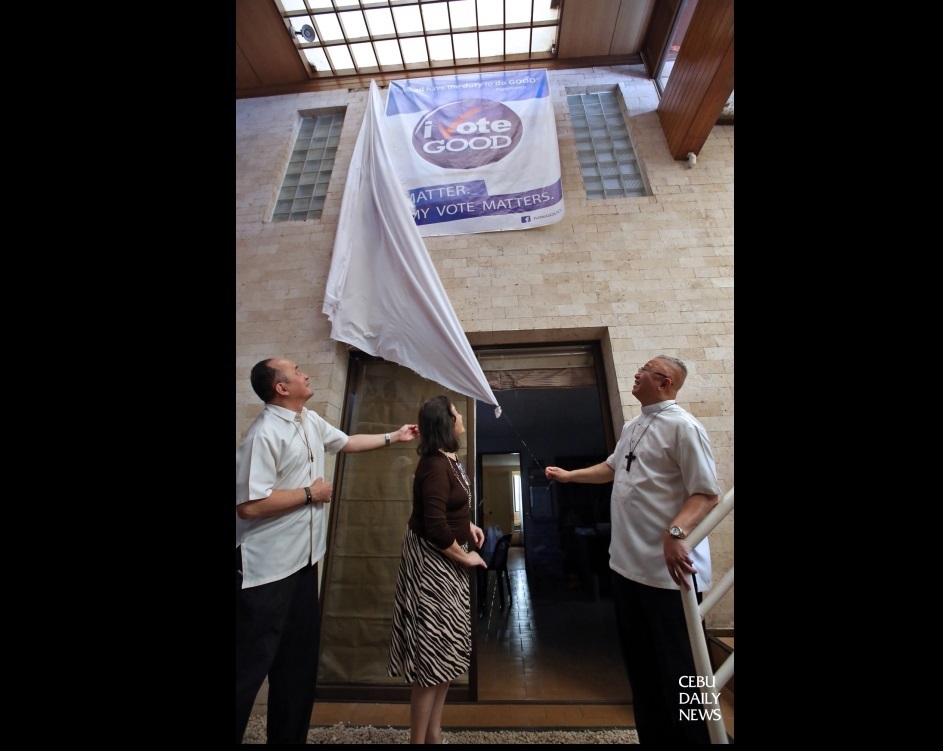
Cebu Archbishop Jose Palma (right) assisted by Fr. Carmelo Diola (left) of Dilaab Foundation and Marilou Chiongbian, C-CIMPEL executive director unveil the “I Vote Good” tarpaulin in their new office at Espina Village. (CDN PHOTO/JUNJIE MENDOZA)
With 14 months to go before the May 2016 elections, a Church-based organization in Cebu called on voters to be guided by their conscience in choosing the country’s next leaders.
“The May 2016 elections is a watershed event. It will define future directions of our beloved country. And so let us invest in this future as well as the present course of our country,” said Fr. Carmelo Diola as he launched the “I Vote Good” campaign of Dilaab Foundation Inc. last March 7.
The group will not endorse a particular candidate.
Instead, Diola said they aim to appeal to the conscience of voters, particularly those from the socioeconomic class D and E as well as the youth.
“We’re here for pastoral accompaniment. It may be likened to slow fire cooking. But we’re almost there,” said Fr. Diola, the executive director of Dilaab Foundation Inc.
Cebu Archbishop Jose Palma, who attended the launching of the ‘I Vote Good campaign,’ encouraged people to sanctify the election process as well as the field of politics.
Difference
“I believe in the importance of elections. Through the years, we manifest the importance of honest and fair elections. But let us also pray for the formation of voters and candidates,” he said.
“We should make a difference for the better. Our own little ways, if gathered together, will become strong currents that will bring about change,” the 63-year-old prelate added.
Among those present during the launch were Marilou Chiongbian of the Cebu-Citizens Involvement and Maturation in People’s Empowerment and Liberation, students from different colleges and universities, police officers, and lay leaders.
Dilaab Foundation presented the LASER Test, a five-point guide developed in 2007 by the Christian-based movement to help voters and candidates make choices based on values and realistic criteria.
These guide questions are: “Does the candidate have a modest lifestyle?”; “Does he or she have a track record of competence and servant leadership?”
Track record
“Who are the persons supporting his candidacy?”; “Is he or she engaged in vote-buying?”; “What is his moral background?”
The LASER Test guides voters about the candidates’ “lifestyle, action, supporters, election conduct and reputation.”
Dilaab Foundation will visit different sitios to call for two behavioral changes: the rejection of vote-buying and second, discerning whom to vote for using the Laser test.
Before the May 2013 elections, Dilaab volunteers conducted a house-to-house campaign. They distributed stickers that read: “Tulo ka adlaw nga kalipay, tulo ka tuig nga pagmahay (Three days of happiness, three years of misery),” “Kristiyano kami, dili baligya ang among boto (We’re Christians, we don’t sell our votes).”
What if none of the candidates pass the LASER test?
“I believe it’s not the LASER test which shall adjust to the voters. It should be the other way around because we cannot alter the Ten Commandments,” Fr. Diola said.
“Well, when you go to the precinct, you don’t have to vote for all positions. For example, if you believe none of the candidates for president is fit for the position, then leave it vacant. In doing this, we’re putting pressure so the right candidates would run,” he added.